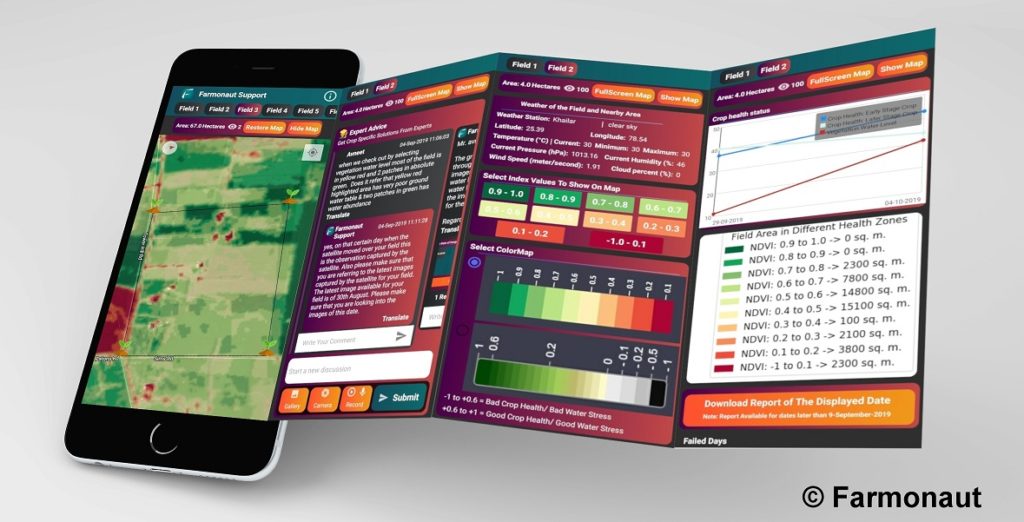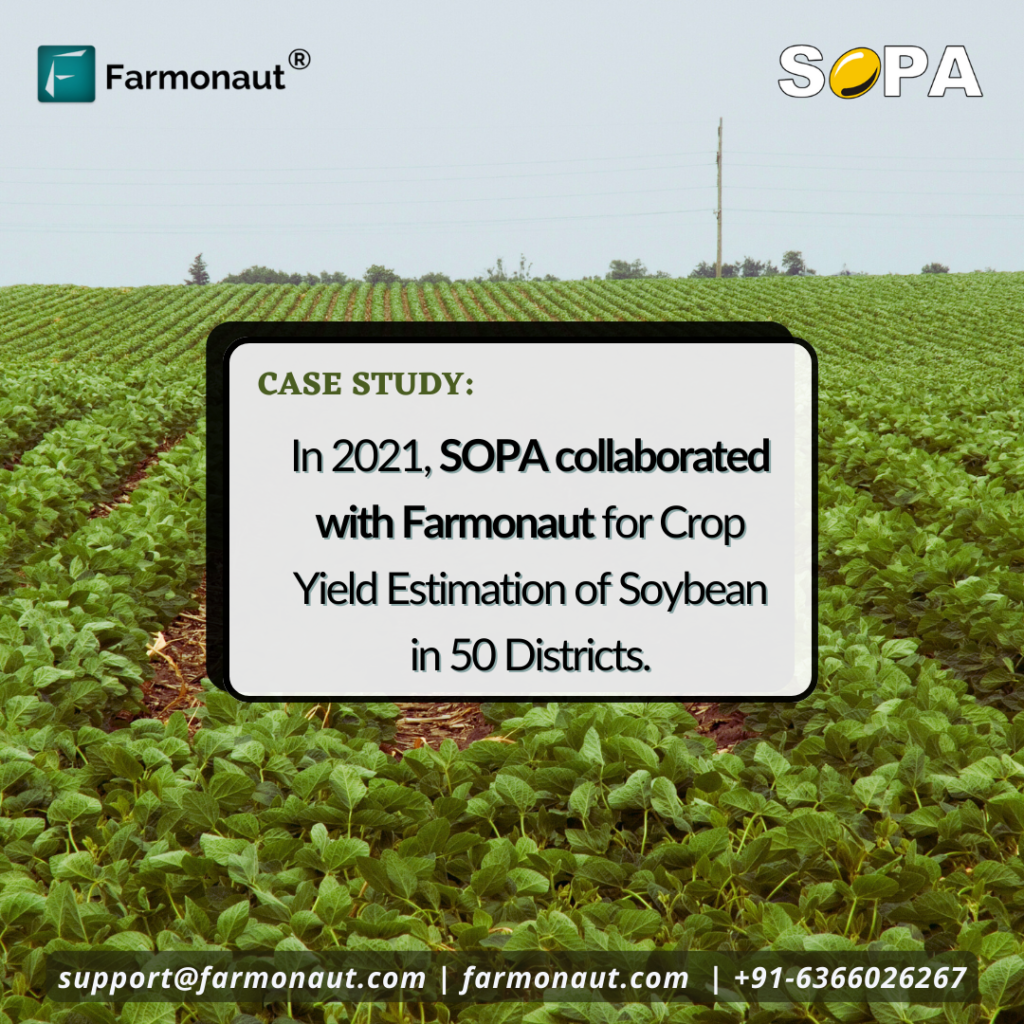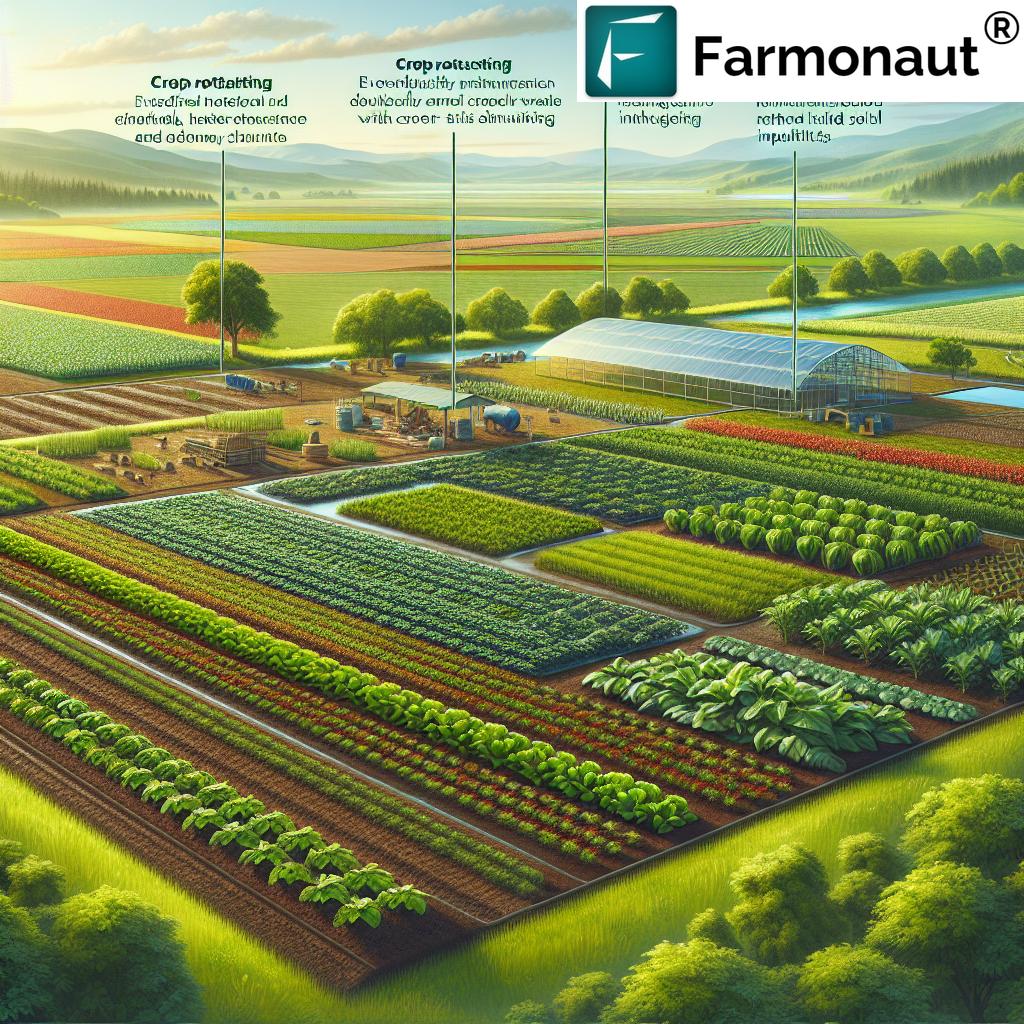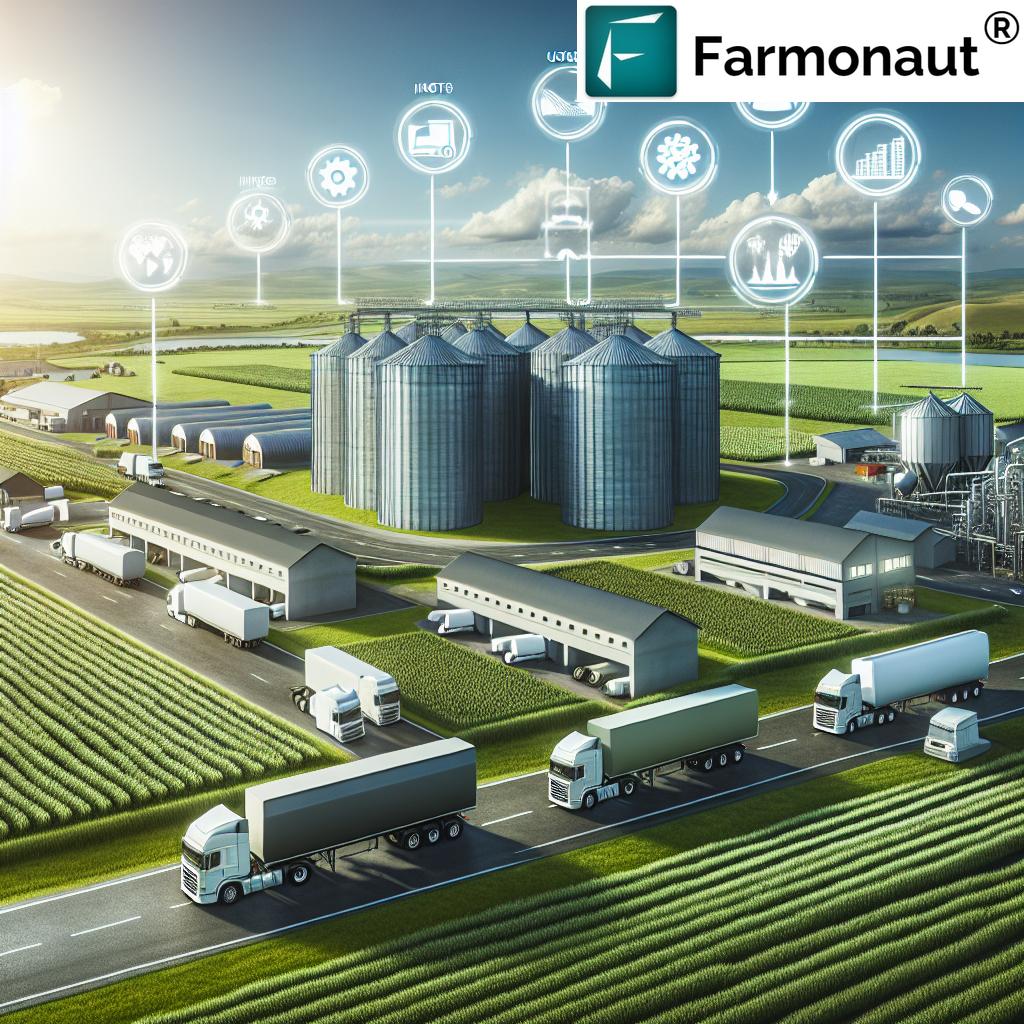Revolutionizing Agriculture: How Farmonaut’s Virtual Solutions Empower Extension Services in 2023
“In 2023, over 50% of agricultural extension services have adopted virtual solutions for professional development and farmer education.”
Welcome to our comprehensive exploration of the evolving landscape of cooperative extension services and agricultural education programs in 2023. As we delve into the latest developments shaping the future of agriculture, we’ll uncover how innovative technologies and solutions are transforming the way we support and educate farmers. Join us as we examine the cutting-edge approaches to pesticide safety education, technical advising, and workforce development that are revolutionizing the agricultural sector.
In this blog post, we’ll highlight the pivotal role of land grant university partnerships in driving collaborative action and their impact on local and regional agricultural communities. We’ll also explore the exciting world of extension professional development opportunities, including virtual events and online courses designed to enhance the skills of agriculture professionals. Additionally, we’ll discuss national policy changes affecting extension funding and program management, offering insights into the future of agricultural outreach initiatives.
As we navigate through these topics, we’ll shine a spotlight on how Farmonaut’s advanced remote sensing tools complement these efforts, providing farmers with actionable data for improved decision-making. Get ready for a comprehensive overview of the evolving cooperative extension landscape and the technologies shaping the future of agriculture education and support services.
The Evolution of Cooperative Extension Services in 2023
Cooperative extension services have long been the backbone of agricultural education and support in the United States. In 2023, we’re witnessing a significant transformation in how these services operate and deliver value to farmers and rural communities. Let’s explore the key changes and innovations that are reshaping the landscape:
- Virtual Solutions: The adoption of digital platforms for education and outreach
- Data-Driven Approaches: Leveraging big data and analytics for precision agriculture
- Collaborative Partnerships: Strengthening ties between universities, government agencies, and private sector entities
- Sustainable Practices: Increased focus on environmentally friendly farming methods
- Technological Integration: Incorporating cutting-edge tools like Farmonaut’s satellite-based solutions
As we delve deeper into these areas, it’s important to note how these changes are not just incremental improvements but represent a paradigm shift in agricultural extension services.
Virtual Solutions: The New Frontier of Agricultural Education
In 2023, virtual solutions have become a cornerstone of agricultural education and extension services. The shift towards online platforms has been accelerated by global events and the need for more flexible, accessible learning options. Here’s how virtual solutions are making a significant impact:
- Online Courses: Comprehensive agricultural programs available anytime, anywhere
- Virtual Workshops: Interactive sessions that bring experts and farmers together digitally
- Webinars: Regular online seminars covering timely agricultural topics and best practices
- Mobile Apps: On-the-go learning and support tools for farmers in the field
One of the leading platforms in this digital revolution is Farmonaut. Their innovative approach combines satellite technology with user-friendly interfaces to provide farmers with crucial insights and education.
Data-Driven Agriculture: Precision Farming with Farmonaut
The integration of data-driven approaches in agriculture has been a game-changer for cooperative extension services. Farmonaut’s advanced remote sensing technology is at the forefront of this revolution, offering farmers and extension professionals unprecedented access to detailed, real-time information about crop health, soil conditions, and more.
Key features of Farmonaut’s data-driven solutions include:
- Satellite-Based Crop Health Monitoring: Real-time insights into vegetation health
- AI-Powered Advisory Systems: Personalized recommendations based on data analysis
- Resource Management Tools: Optimize water usage and fertilizer application
- Blockchain-Based Traceability: Ensure transparency in agricultural supply chains
By leveraging these tools, extension services can provide more targeted, effective advice to farmers, leading to improved yields and sustainable practices.
Collaborative Partnerships: Strengthening Agricultural Networks
In 2023, the power of collaboration in agricultural extension services cannot be overstated. Land grant universities are at the heart of these partnerships, working closely with government agencies, private sector companies, and non-profit organizations to create a robust support system for farmers.
“Land grant universities collaborate with extension services in 100% of U.S. states, impacting millions of farmers annually.”
These collaborative efforts are yielding impressive results:
- Research-Driven Innovation: Universities conduct cutting-edge research that informs extension practices
- Knowledge Transfer: Efficient dissemination of new agricultural techniques and technologies
- Resource Pooling: Shared resources lead to more comprehensive support for farmers
- Policy Influence: Collaborative insights shape agricultural policies at local and national levels
Farmonaut’s role in this collaborative ecosystem is significant. By providing advanced technological solutions, they enable extension services to offer more precise, data-backed advice to farmers.
Sustainable Practices: The Green Revolution in Extension Services
Sustainability has become a central focus of cooperative extension services in 2023. With growing concerns about climate change and environmental degradation, extension professionals are increasingly emphasizing eco-friendly farming practices. This shift is not just about environmental stewardship; it’s also about ensuring the long-term viability of agriculture.
Key areas of focus include:
- Soil Health Management: Techniques to maintain and improve soil quality
- Water Conservation: Efficient irrigation methods and water-saving technologies
- Integrated Pest Management: Reducing reliance on chemical pesticides
- Carbon Footprint Reduction: Strategies to minimize greenhouse gas emissions in farming
Farmonaut’s technology plays a crucial role in promoting sustainable practices. Their satellite-based monitoring system helps farmers make informed decisions about resource use, reducing waste and environmental impact.
Discover Farmonaut’s API for custom agricultural solutions: Farmonaut API
Technological Integration: Farmonaut’s Impact on Extension Services
The integration of advanced technologies into extension services has been transformative. Farmonaut’s suite of tools exemplifies how technology can enhance the effectiveness of agricultural support and education. Let’s explore how Farmonaut’s solutions are being utilized by extension professionals:
- Remote Crop Monitoring: Extension agents can assess crop health remotely, providing timely advice
- Data-Driven Decision Making: Farmonaut’s insights enable more informed recommendations
- Precision Agriculture Training: Extension services use Farmonaut’s platform to educate farmers on precision farming techniques
- Resource Optimization: Tools for better management of water, fertilizer, and other inputs
By incorporating these technologies, extension services can offer more precise, personalized support to farmers, leading to improved agricultural outcomes.
Professional Development in Agricultural Extension
The landscape of professional development for agricultural extension professionals has undergone significant changes in 2023. With the rapid evolution of farming technologies and practices, continuous learning has become more crucial than ever. Here’s how extension professionals are staying up-to-date:
- Online Certification Programs: Specialized courses in emerging agricultural technologies
- Virtual Conferences: Global knowledge-sharing events accessible from anywhere
- Microlearning Modules: Bite-sized, focused learning on specific agricultural topics
- Peer-to-Peer Learning Platforms: Digital spaces for extension professionals to share experiences and best practices
Farmonaut contributes to this professional development ecosystem by offering training on their satellite-based technology and data interpretation techniques.
Access Farmonaut’s Developer Docs for in-depth technical information: Farmonaut API Developer Docs
National Policy and Funding: Shaping the Future of Extension Services
In 2023, national policies and funding decisions are playing a crucial role in shaping the future of cooperative extension services. Key developments include:
- Increased Federal Funding: Greater investment in agricultural research and extension
- Policy Focus on Climate-Smart Agriculture: Initiatives supporting sustainable farming practices
- Digital Infrastructure Support: Programs to improve rural broadband access for better technology adoption
- Cross-Sector Collaboration Incentives: Policies encouraging partnerships between academia, industry, and government
These policy changes are creating new opportunities for extension services to expand their reach and impact, with technologies like Farmonaut’s playing a key role in implementing these initiatives effectively.
The Role of Farmonaut in Modern Extension Services
Farmonaut’s innovative solutions are becoming increasingly integral to modern extension services. By providing cutting-edge tools for remote sensing and data analysis, Farmonaut is enabling extension professionals to offer more precise, timely, and effective support to farmers. Here’s how Farmonaut is making a difference:
- Enhanced Decision Support: Real-time data helps extension agents provide better advice
- Efficient Resource Allocation: Targeted interventions based on satellite imagery and AI analysis
- Improved Farmer Education: Visual tools for demonstrating best practices in crop management
- Sustainable Farming Promotion: Data-driven insights for eco-friendly agricultural practices
The integration of Farmonaut’s technology represents a significant leap forward in the capabilities of extension services, aligning perfectly with the sector’s evolving needs in 2023.
Evolving Cooperative Extension Services: A Comparative Look
| Service Aspect | Traditional Approach | 2023 Innovation |
|---|---|---|
| Education Delivery | In-person workshops | Virtual events and online courses |
| Technical Advising | On-site farm visits | Remote consultations with data-driven insights |
| Pesticide Safety Training | Classroom-based instruction | Interactive online modules and virtual simulations |
| Data Collection | Manual field surveys | Farmonaut’s remote sensing technology |
| Community Outreach | Local meetings and print materials | Social media engagement and digital content distribution |
The Future of Agricultural Extension: Trends and Predictions
As we look towards the future of agricultural extension services, several trends and predictions emerge:
- Increased AI Integration: More sophisticated AI-driven advisory systems
- Personalized Learning Paths: Tailored educational programs based on individual farmer needs
- Augmented Reality in Field Training: Immersive experiences for hands-on learning
- Blockchain for Transparency: Wider adoption of blockchain for supply chain management
- Drone Technology: Integration of drone-based monitoring with satellite data
Farmonaut is well-positioned to play a significant role in these future developments, continually innovating to meet the evolving needs of the agricultural sector.
Experience Farmonaut on your mobile device:
Conclusion: Embracing the Digital Revolution in Agricultural Extension
As we’ve explored throughout this blog post, the landscape of cooperative extension services and agricultural education is undergoing a profound transformation in 2023. The integration of virtual solutions, data-driven approaches, and advanced technologies like those offered by Farmonaut is revolutionizing how we support and educate farmers.
Key takeaways include:
- The shift towards virtual and online educational platforms
- The critical role of data and precision agriculture in modern farming
- The importance of collaborative partnerships in driving innovation
- The growing emphasis on sustainable and environmentally friendly practices
- The transformative impact of technologies like Farmonaut’s remote sensing solutions
As we move forward, it’s clear that the future of agricultural extension lies in embracing these digital innovations while maintaining the core mission of supporting farmers and rural communities. By leveraging the power of technology and data, extension services can provide more targeted, effective, and timely support than ever before.
The journey of agricultural innovation continues, and we’re excited to see how solutions like Farmonaut will continue to shape the future of farming and extension services in the years to come.
FAQ: Revolutionizing Agriculture with Virtual Solutions
Q: How are virtual solutions changing agricultural extension services?
A: Virtual solutions are making education and support more accessible, allowing for remote consultations, online courses, and real-time data sharing. This enables extension services to reach more farmers efficiently and provide timely advice.
Q: What role does Farmonaut play in modern extension services?
A: Farmonaut provides advanced remote sensing technology and data analysis tools that help extension professionals offer more precise and data-driven advice to farmers. Their satellite-based solutions enable real-time crop monitoring and resource optimization.
Q: How are land grant universities contributing to agricultural innovation?
A: Land grant universities are driving research in agricultural sciences, developing new technologies, and fostering partnerships between academia, industry, and government. They play a crucial role in disseminating knowledge through extension services.
Q: What are some key focus areas for sustainable agriculture in 2023?
A: Key areas include soil health management, water conservation, integrated pest management, and reducing carbon footprints in farming operations. Technologies like Farmonaut’s are helping farmers implement these sustainable practices more effectively.
Q: How is professional development for extension agents evolving?
A: Professional development now includes online certification programs, virtual conferences, microlearning modules, and peer-to-peer digital platforms. There’s an increased focus on staying updated with emerging technologies and sustainable farming practices.
Q: What impact are national policies having on extension services?
A: National policies are increasing funding for agricultural research and extension, focusing on climate-smart agriculture, improving rural digital infrastructure, and encouraging cross-sector collaborations. These policies are shaping the future direction of extension services.
Farmonaut Subscriptions
















